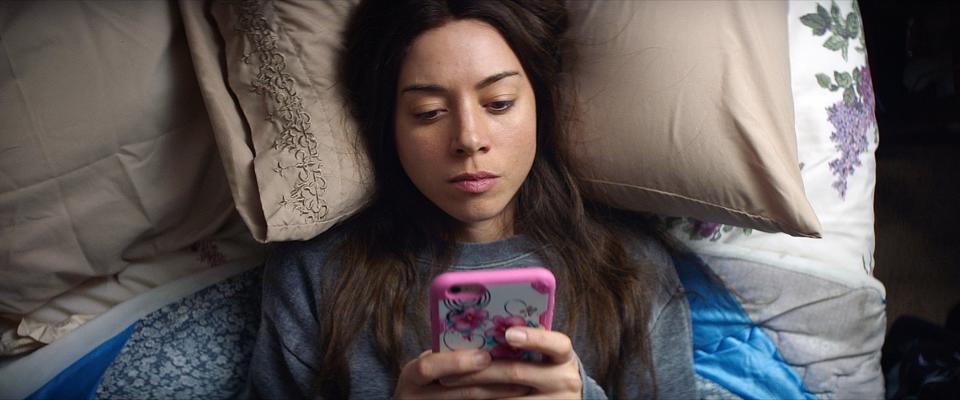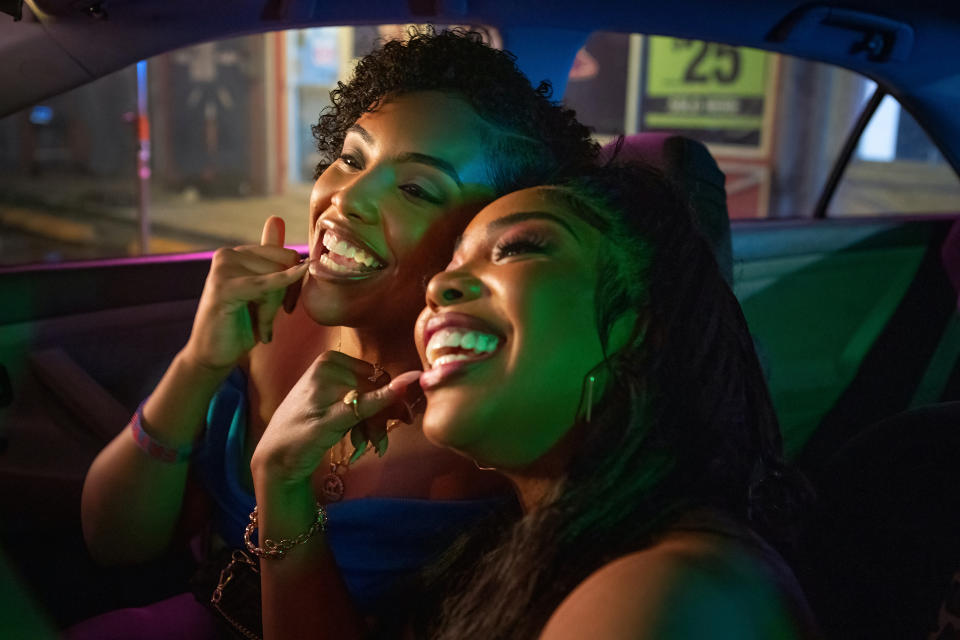How 'Ingrid Goes West', 'Not Okay', & 'Rap Sh!t' Portray How Women Perform on Social Media

- Oops!Something went wrong.Please try again later.
Social media obsession satire Ingrid Goes West was released five years ago to mixed reviews — but its exploration of how women construct personalities and perform for one another online may well have been ahead of its time. Ingrid Goes West stars Aubrey Plaza as Ingrid Thorburn, a lonely, awkward, and grieving woman whose desire to be besties with the social media influencers on her feed sours into mania. Elisabeth Olsen and Meredith Hagner, on the cusp of their fame, play the influencer-objects of her obsession. As social media has continued to evolve at warp speed in the years since Ingrid Goes West‘s release, the film now seems less like a darkly honest parable about the perils of living for online acclaim and more like the first entry in an emerging genre: The stories of the lives we create online, and how women in particular communicate to and with each other in the world of social media.
The emotional core of Ingrid Goes West, Ingrid’s obsession with influencer Taylor, is nothing new — we’ve been telling stories about it since time immemorial, from Greek myths to old Hollywood. But the film was novel in exploring social media obsession specifically, a phenomenon we’ve all likely experienced on occasion, just hopefully not to the degree that Ingrid does. Ingrid’s particular obsession leads her to move across the country, hurt the few real friends she manages to make, and spend her inheritance trying to impress the very people who make a living from influencing others.
More from SheKnows

Courtesy Everett Collection.
Click here to read the full article.
As an early take on the perils of becoming too invested in influencer culture, Ingrid Goes West devotes itself to showing how Ingrid harms herself and damages her real-world life on this quest to appear likable and valuable to someone whose own Instagram presence she admires. Ingrid is always operating at a loss because she doesn’t fully understand the cost-benefit analysis of living your life online: losing friends and alienating people, to paraphrase Toby Young’s 2001 memoir about failing to make it in the media industry. At least not until the very end of the movie when she goes viral for owning up to her obsession — the first authentic thing she’s done. It remains to be seen whether she’s doomed to repeat her toxic female relationship patterns, or, now that she’s internet famous, whether she’ll be on the receiving end of her own followers’ fanaticism.
Hulu’s Not Okay starring Zoey Deutch takes the genre a step further. Unlike Ingrid, Deutch’s character Danni Sanders very much understands what it means to grow up online — and thus, the film explores not just how she harms her own life by prioritizing an online reality, but how she actively harms those around her and reinforces global systems of harm with the image she presents online.
Watch 'Not Okay' on Hulu
$6.99
Sign Up
Deutch’s Danni is a very online zillennial with the triggering Y2K hair and wardrobe to prove it, working as a photo editor for a Buzzfeed-esque media startup with the dream of being a famous writer. She puts her image editing skills to use by photoshopping herself into images of Paris, where she’s telling people she’s attending a prestigious writer’s retreat. And then tragedy strikes — for the people actually in Paris during a terrorist attack. Lest Danni be caught in her lie, she spins an even bigger one, becoming the face of anti-violence activism in America, appropriating the work of a Black teen named Rowan (Mia Isaac), whom she’s befriended and who has actually been doing anti-violence activism.
The lies that Danni tells on social media are of a decidedly different flavor than those Ingrid of Ingrid Goes West shares on her feed, though both characters are essentially constructing full fantasies and passing them off as their daily lives. With Danni’s lies, the film explores cultural appropriation and white victimhood: how a white face amplifying anything from true crime to a style of dress can garner mainstream attention while the traditions and traumas alike of people of color go ignored.
While Danni hatches her master plan of deception to impress a guy, it’s Danni’s relationship with Rowan that’s the most interesting. While society has normalized and validated white women’s attention-seeking behavior online or otherwise, women of color are rarely given the same benefit of the doubt — and so, Rowan sees instantly through Danni’s white girl antics and greets her with a distrust Danni will go on to fully earn. But Rowan doesn’t allow herself to sit in those feelings for long, pushing past her doubts, and the film would have benefited from further exploration of how Rowan polices her feelings toward Deutch’s character rather than brushing them off in the rushed climax. The film makes the point a few times over that, in living her life for likes, Danni is harming the people whose real experiences she co-opts: She harms Rowan by co-opting her activism work, and she harms true trauma victims by co-opting their trauma for online fame (the latter point hammered home by a support group scene in which Danni shares about her newfound notoriety in a support group attended by many Black survivors of actual trauma).
In both cases, Danni’s status as a white woman is an indelible aspect of why she feels so entitled to do what she does and why she’s so easily believed — and the film shows how the elevation of white stories on social media mirror our own worst impulses as a society.
Issa Rae’s Rap Sh!t, currently airing on HBO Max, is another entry about the stories we tell on social media and how they interact with our lives — and thankfully, this time not from a white woman’s point of view. The series takes an integrative approach in not only having us watch characters create social media realities, but showing us storylines and narratives directly from social media to advance the plot and character development. The eight-episode series follows two Black women, Shawna (Aida Osman) and Mia (KaMillion), in Miami who were friends in high school and reconnect — you guessed it! — via social media as they’re both trying to make the titular rap shit happen for themselves. Rap Sh!t takes the Instagram-heavy stylization of Ingrid Goes West — easily dismissed at the time — and runs with it, incorporating the social media images and videos and screens throughout which we digest our lives as a seamless part of how we view these characters’ worlds, just as we view the worlds of people we know in real life. In the moments when Rap Sh!t drops the social media filter, it conveys further meaning, showing us through more traditional camera work that the characters have lowered their facades for the moment.

Alicia Vera/HBO Max.
What’s interesting about Ingrid Goes West, Not Okay, and Rap Sh!t is not just how they show the creeping takeover of social media in how we live our lives, but that they demonstrate the avenues social media creates for women to break from patriarchal expectations and communicate directly with one another. The interactions they have seeking other women’s attention may be just as toxic and destructive to their lives as any other validation-seeking behavior, but it opens the door to a uniquely male gaze-less world. Women trying to become internet sensations fall prey to all kinds of pitfalls outlined in these movies and TV shows, but they also introduce a new set of terms for success, different from those women have been asked to follow in daily life for so long.
In Ingrid Goes West, Ingrid is obsessed with gaining the approval of the female social media influencers she follows: that means following a detailed regimen of aesthetically pleasing brunches and clutch bags, not curating a feed of bikinis and belfies more likely to attract male attention. Not Okay‘s Danni, who — as discussed — is not immune to desiring male attention, still conforms herself to that which she believes will be most appealing for her online persona — and the flared jean, bleached bangs result is as quintessentially 2000s as it is completely man-repelling. Rap Sh!t goes the furthest in attempting to extricate social media from the male gaze: Shawna schools Mia in the concept of it in one scene, and has the explicit goal of showing that women in rap don’t have to show their bodies to be successful. Throughout the series, there’s a barrage of Facetimes, Reels, and TikToks taken from unflattering angles that would amplify double chins in those of us less luminous than Osman and KaMillion and which show the mundanity of everyday life. Throughout, Mia also performs on OnlyFans to make some extra cash, demonstrating the lurking, not entirely escapable, male gaze within these online worlds, but Rap Sh!t explores how social media can move beyond those worlds in a self-aware way.
Watch 'Rap Sh!t' on HBO Max
$9.99
Sign Up
One scene in particular hints at how women’s online communications can outshine the importance of male validation. In episode 2, Shawna has just sexted with her long-distance partner, and flashes a smile at her phone that her boyfriend thinks is a post-coital grin. In reality, Shawna’s beaming at a text from Mia about how she can’t stop thinking about the track they just recorded. Women coming more fully into themselves when they have the opportunity to strive for more than just male attention is a tale as old as women’s liberation — but this new genre of movie and TV show is just scratching the surface of the ways in which social media took that a step further. Ingrid Goes West and Not Okay are worst-case examples of what it looks like to lose yourself to the world of online influence, even if you get to ditch the male gaze on the way — Rap Sh!t examines what it’s like to explicitly try and chase that feeling of performing without being objectified.
As social media continues to evolve, what movies and TV have to say about it will too. These entries are only the beginning.
Best of SheKnows
Jennette McCurdy, Olivia Newton-John, & More Shocking Celebrity Memoirs You Can Read Right Now
Will House of the Dragon Give Us the Queer Lead They Denied Us in Game of Thrones?
A Look Back at All 23 of Serena Williams' Epic Grand Slam Championship Wins
Sign up for SheKnows' Newsletter.
For the latest news, follow us on Facebook, Twitter, and Instagram.

